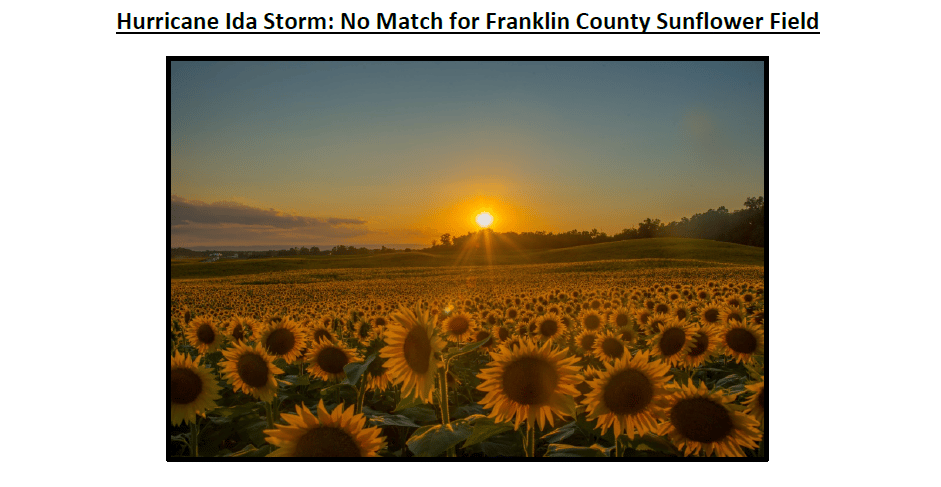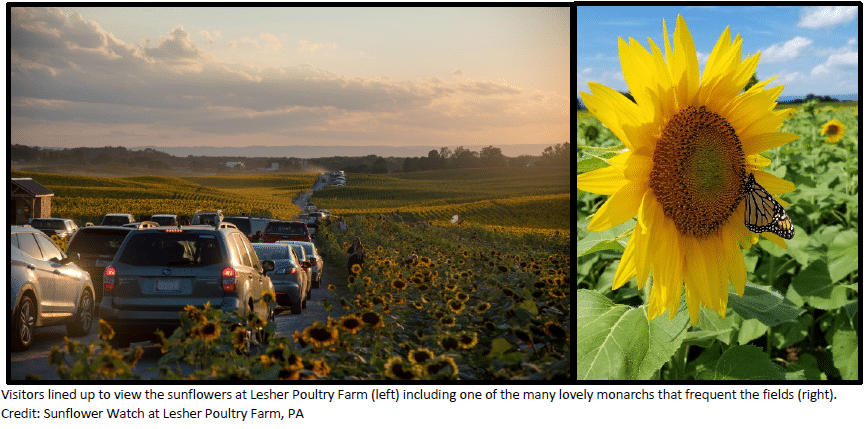Hurricane Ida Storm: No Match for Franklin County Sunflower Field
Article written by and posted with permission by Caitlin Lucas, Franklin County Conservation District.
Leslie Bowman, 2021 Franklin County Conservation Farmers of the Year and host of the Franklin County local treasure, Sunflower Watch at Lesher Poultry Farm, planted 211 of his total 370 acres in sunflowers this year. Many might not think of sunflowers as a farmed crop, but you may recognize their harvest on the shelves at the store as black oil sunflower bird seed or sunflower cooking oil. These 211 acres are home to an astonishing 5.3 million sunflowers which are widely loved by visitors from as far as Virginia and by the abundance of monarch butterflies and honey bees observed on the property. Planted in these fields are about ½ an acre of 16 different varieties for visitors to pick and take home while the remaining 210.5 acres contain the black oil seed crop.
Typically, Bowman plants his acres in grain and soybeans to feed his poultry operation chickens but rotates the sunflowers in to diversify his fields. When asked why he chose sunflowers, Bowman replied that he was looking for a cash crop different from his typical choices that could be planted in rotation at this time of year after his wheat is finished. He also added that “diversifying” the crops provides several benefits to a producer:
– Regarding the soil, it allows for different root paths to form which can help prevent soil compaction.
– Regarding the soil, it minimizes overconsumption of any one nutrient to keep the soil chemistry balanced.
– Regarding production, it limits a producer’s risk of total crop loss in the event that a particular crop has a low yield season.
Many of us experienced different levels of storms passing through Pennsylvania from Hurricane Ida back in August of 2021, some more severe than others. Bowman stated that the fields received 3.17 inches of rain within approximately 24 hours and noticed only moderate winds that would align with a typical thunderstorm, leaving a few small branches around the fields. While assessing possible damage to the field after the storms, Bowman discovered that almost 100% of the flowers were intact, with only a few blown down by the storm.
When asked if the lack of damage is normal for a producer after a storm, he replied that he felt his fields remained intact due to the rate of the rainfall and infiltration capabilities of his soil – his fields accepted all of the water rather than flooding the flowers. Bowman contributes the resilience and ability of the fields to handle all of this water to their long-term practice of best management practices such as no-till farming with high residue and cover crops, noting that without the long-term use of these practices, soil compaction and shallow root systems could have allowed the sunflowers to come loose at the soil surface and potentially uproot or fall over in the storm. Without good infiltration on their hilly terrain, they also could have experienced high levels of runoff of their soil from the fields to the nearby stream or gullies carved into the soil. Lesher Poultry practices these methods in all of their fields for healthy, protected soil and successful crop yield.
Bowman shared that other producers have asked him about his methods in the past and reiterated how important it is to understand the differences of raising sunflowers as part of a rotation rather than a standard soybean or grain crop. However, in his trials he has become successful with sunflowers which has certainly been a benefit for the visitors of his fields, monarchs and bees included! The sunflower fields have acted to bridge the gap between the agricultural community to the rest of the local community by giving something enjoyable to the public, evident by the many visitors they receive each year. To stay in the loop on status of the sunflowers and their blooming schedule, follow https://www.facebook.com/sunflowerwatch. For more information on best management practices like Bowman’s for your operation, contact Franklin County Conservation District at(717)-264-5499 or via our Facebook at https://www.facebook.com/FranklinCCD!


